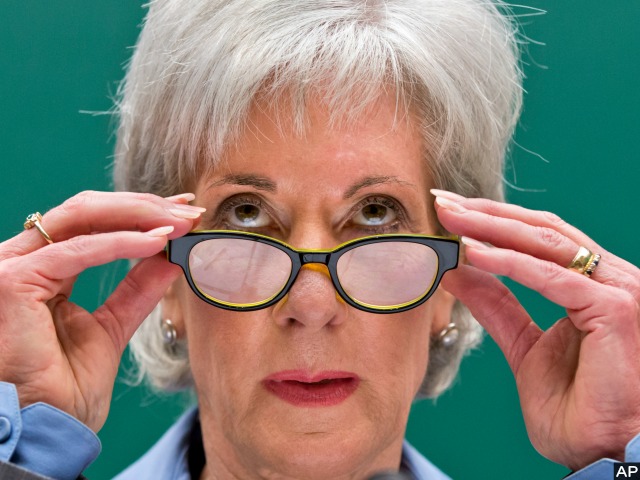
On Thursday, less than two weeks after telling the press she was going to “stick around,” HHS Secretary Kathleen Sebelius announced her resignation from the Obama Administration. The announcement caught Washington by surprise, as the chattering class had only recently convinced itself that the troubles for the health care law were in the rear-view mirror. The resignation, though, now triggers two words that could prove a nightmare for Democrats and their hope to stave off disaster in November: “Confirmation Hearing”.
When the Sebelius resignation was announced, the White House indicated it would nominate OMB Director Sylvia Burwell to be the next HHS Secretary. Burwell seems a relatively competent technocrat, having held senior positions in the Clinton Administration and in the private sector at McKinsey and the Bill Gates and Wal-Mart foundations. Senators may question her, however, about her role in ordering parks and monuments closed during the government shutdown last year.
The real drama of the hearings, however, is the opportunity it affords Republicans to focus attention back on ObamaCare, just months before the midterm elections. Hearings on Burwell’s confirmation are likely to be held this summer, just as the campaigns are entering the final stretch to November. The hearings will give the GOP a chance to resume its attacks on the sweeping health care law.
Despite Senate Majority Leader Harry Reid’s use of the “nuclear option” to let nominees pass with only a bare-majority vote — meaning no Republicans will be needed to confirm Burwell — the hearings will still provide a spotlight on the health care law that vulnerable Democrats have cause to fear.
Worse for Democrats, however, is the fact that the confirmation hearings could come at a time that significant problems with ObamaCare are emerging. Two new studies, by the Rand Corporation and pharmaceutical-benefits manager ExpressScripts, cast doubt on the White House’s recent victory lap over the health care law.
There are two enormous unknown variables about the current state of ObamaCare. The first uncertainty is the number of enrollees who are paying their premiums. The numbers reported by the Obama Administration include only those who have signed up for coverage, not those who have actually received it by paying premiums.
The biggest unknown, however, is the proportion of young, relatively healthy, individuals who have enrolled. ObamaCare only “works” if lots of people who rarely need health care pay into the larger risk pool. If they don’t, and the risk pools in the exchanges are disproportionately older and sicker, than premiums will necessarily skyrocket.
The Administration claims it doesn’t have information on these questions. This is absurd, since the government has to individually verify every enrollee’s eligibility for possible premium subsidies. Setting that aside, the true picture of ObamaCare enrollees will eventually emerge over the coming months.
Insurers will have to evaluate the risk pools in the exchanges to set premium rates for next year. This will likely also effect premiums for existing employer-provided health insurance. If either of the currently unknown variables fail to meet the expectations of the law, insurers will have to impose significant premium increases.
These premium increases will be announced later this year, around the summer. Just as confirmation hearings in the Senate on Sebelius’ replacement get underway. Democrats are approaching the “long dark, tea-time of the soul.”

COMMENTS
Please let us know if you're having issues with commenting.